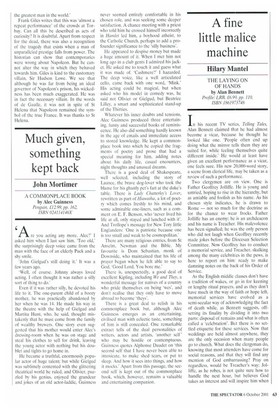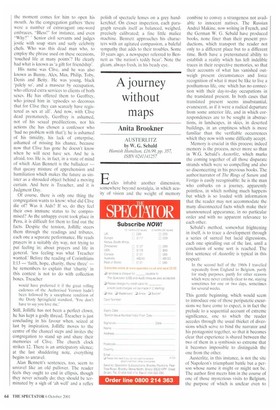A fine little malice machine
Hilary Mantel
THE LAYING ON OF HANDS by Alan Bennett Profilel LRB,f6.99, pp. 110, ISBN 1861973748 In his recent TV series, Telling Tales, Alan Bennett claimed that he had almost become a vicar, because he thought he looked like one. 'People often end up doing what the mirror tells them they are suited for, while feeling themselves quite different inside.' He would at least have given an excellent performance as a vicar, one feels sure. His new 20,000-word story, a scene from clerical life, may be taken as a review of such a performance.
Two clergymen are on view. One is Father Geoffrey Jolliffe. He is young and untried, hoping to rise in the hierarchy, but as amiable and foolish as his name. As his chosen style indicates, he is drawn to Rome — not so much for the doctrine as for the chance to wear frocks. Father Jolliffe has an enemy; he is an archdeacon and his name is Treacher, His malevolence has been signalled; he was the only person who did not laugh when Geoffrey recently made jokes before the Diocesan Selection Committee. Now Geoffrey has to conduct a memorial service, and Treacher. skulking among the many celebrities in the pews, is here to report on him: ready to make damning notes on the back of his Order of Service.
As the English middle classes don't have a tradition of wakes, or go in for keening or lengthy ritual prayers, and as they don't have much in the way of faith or hope left, memorial services have evolved as a semi-secular way of acknowledging the fact of death while, as Bennett suggests, offsetting its finality by dividing it into two parts: disposal of remains and what is often called a 'celebration'. But there is no settled etiquette for these services. Now that weddings are held almost anywhere, they are the only occasion when many people go to church. What does the clergyman do, knowing that most attenders have come for social reasons, and that they will find any mention of God embarrassing? Pray on regardless, would be Treacher's way; Jotlife, as he robes, is not quite sure how to handle the next hour, but believes God takes an interest and will inspire him when
the moment comes for him to open his mouth. As the congregation gathers 'there were a number of extravagant one-word embraces, "Bless!" for instance, and even "Why?" ' Senior civil servants and judges jostle with soap stars and surly celebrity chefs. Who was this dead man who, to employ the phrase used on these occasions, 'touched life at many points'? He clearly had what is known as 'a gift for friendship'.
His name was Clive, and he was also known as Bunny, Alex, Max, Philip, Toby, Denis and Betty. He was young, black 'palely so', and a masseur by occupation, who offered extra services to clients of both sexes. He has offered them to Geoffrey, who joined him in 'episodes so decorous that for Clive they can scarcely have registered as sex at all'. And now, with Clive dead prematurely, Geoffrey is ashamed, not of his sexual predilections, nor his actions (he has chosen a confessor who 'had no problem with that'); he is ashamed of his timidity, his lack of enterprise, ashamed of missing his chance, because now that Clive has gone he doesn't know when he will next have sex. And he is afraid, too. He is, in fact, in a state of mind of which Alan Bennett is the balladeer — that queasy mixture of apprehension and humiliation which makes the future as sinister as a shrouded object behind a moving curtain. And here is Treacher, and it is Judgment Day.
Of course, there is only one thing the congregation wants to know: what did Clive die of? Was it Aids? If so, do they feel their own immune status to be compromised? As the unhappy event took place in Peru, it is difficult for them to find out the facts. Despite the tension, Jolliffe steers them through the readings and tributes, each one a separate performance. He reads prayers in a suitably dry way, not trying to put feeling in; about prayers and life in general, 'less feeling was what Treacher wanted.' Before the reading of Corinthians 1:13 — 'faith, hope, charity, these three' — he remembers to explain that 'charity' in this context is not to do with collection boxes. Treacher
would have preferred it if the great rolling cadences of the Authorised Version hadn't been followed by a saxophone rendition of the Dusty Springfield standard, You don't have to say you love me.'
Still, Jolliffc has not been a perfect clown. he has kept a godly thread. Treacher is just concluding in his favour when, seized at last by inspiration, Jolliffe moves to the centre of the chancel steps and invites the congregation to stand up and share their memories of Clive. The church clock strikes 12. There is an anticipatory silence; at the last shuddering note, everything begins to unravel.
Alan Bennett's sentences, too, seem to unravel like an old pullover. The reader feels they ought to end in ellipsis, though they never actually do; they should be terminated by a sigh of 'all well' and a reflex polish of spectacle lenses on a grey handkerchief. On closer inspection, each paragraph reveals itself as balanced, weighed, precisely calibrated; a fine little malice machine. Bennett approaches his characters with an agitated compassion, a baleful sympathy that adds to their troubles. Some 10 years ago, a newspaper referred to Bennett as 'the nation's teddy bear'. Note the gleam, always fresh, in his beady eye.



































































































 Previous page
Previous page